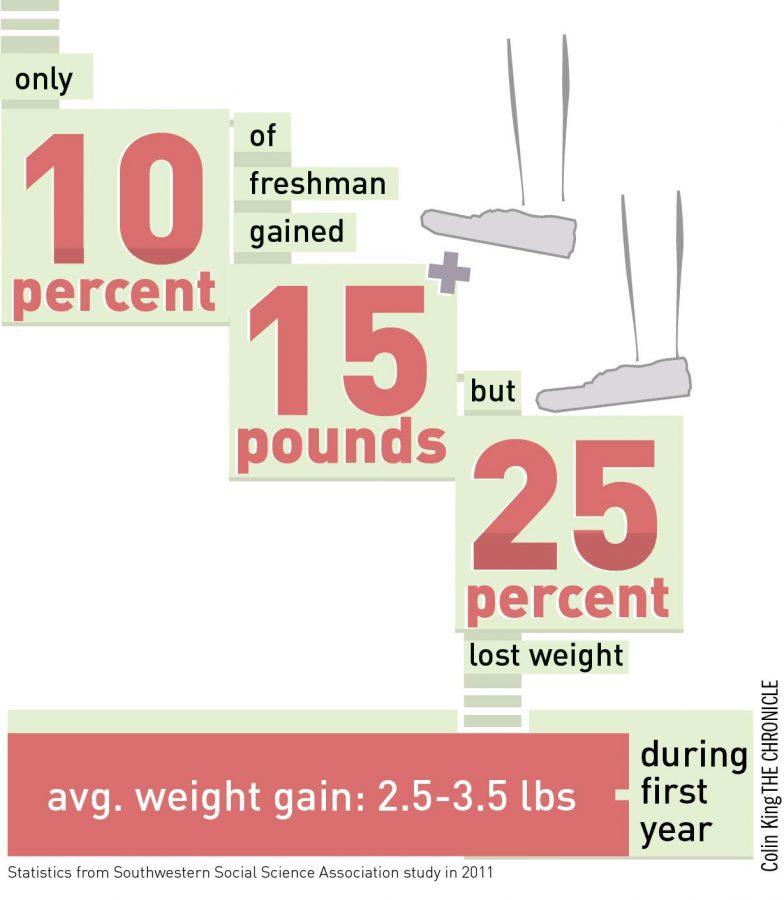Freshman 15 proven a myth
September 22, 2014
AFTER DECADES OF speculation, research continues to mount that the “freshman 15”—a theory that college freshmen gain 15 pounds during their first year—may be false.
A 2011 study by researchers at the University of Michigan-Dear- born and Ohio State University found that the average weight gain during freshman year lies in the range of 2.5–3.5 pounds. Similarly, a 2005 study by David Fields, assistant professor of physiology at the University of Oklahoma, found an average weight gain of 2.4 pounds when 137 female students were tracked as freshmen.
More recently, a 2014 study by researchers at the University of Scranton compared the Body Mass Index of students at a small university for four years and found no significant difference between the two.
Fields said his research on the myth did not reveal any proof that individuals gain remotely close to 15 pounds but that does not mean it will go away.
“I am unaware of any peer-re-viewed study demonstrating a net gain of 15 pounds,” Fields said. “People throw around ‘the freshman 15’ as if it is true. It is not. But it still does not stop people from believing it and perpetuating it.”
Mark Brticevich, Columbia’s coordinator of fitness, athletics and recreation, agrees that the freshman 15 is a myth.
“Not everyone gains weight when they come to college,” Brticevich said. “In fact, some people lose weight. When you do have weight gain, instead of 15, it winds up being more like seven pounds.”
Brticevich said there are many different scenarios because every student is different. He said most college freshmen are not accustomed to living and cooking on their own, so they buy the cheapest food available, which tends to be fast food.
“Fast food is low on nutrients, high on calories and cheap in cost,” Brticevich said. “Therefore, you might take care of your budget currently, but the chances of obesity or contributing to future diseases down the road is pretty high.”
One way to counter-act weight gain is via exercise. In fact, it pays lifelong dividends, said I-Min Lee, professor of Medicine at Harvard Medical School and professor of epidemiology at Harvard School of Public Health. Lee said more than six decades of research has shown that people who are physically active live longer have lower rates of chronic diseases such as heart disease, stroke and cancer, have lower rates of diabetes, better bone health and are less likely to fall and have fractures and have better mental health.
“Recent studies have shown that if everyone in the world became physically active to a level that met recommendations, we could remove a total of five million deaths throughout the world,” Lee said. “If everyone in the world would stop smoking, we would also have five more million fewer deaths. So, not being physically active is as bad as smoking for your health.”
Alexiz Pedraza, a sophomore audio arts & acoustics major, said he exercises at the Columbia Fitness Center, located at 731 S. Plymouth Court, three times a week during the semester.
“It makes me feel better, more conditioned—I do not get tired going up stairs,” Pedraza said. “[I am] more energized throughout the day, especially if [I] lift in the morning.”
Kelley Ahlstrom, a senior music major who exercises five times per week, said she does cardio because she likes to break a sweat.
“It makes me feel good,” Ahlstrom said. “I feel it release toxins from your body and the cardio is overall good.”
While exercising is generally healthy, Lee cautions students to start slow.
“Someone who does nothing and then decides, ‘Oh, I’m going to run for two hours,’ and then the next day they will feel tremendously sore,” Lee said. “People who are not physically active and they want to take up physical activity, the recommendation is to start slowly.”
Lee encourages beginners to take a 30-minute walk and build up from there.
“If you start slow and increase gradually, you are unlikely to [have to] suffer muscular-skeletal injuries,” she said.
The effects that healthy choices have on students will be seen across the board, Brticevich said.
“Each person should look and examine themselves and not focus on what other people do or what is good for other people,” Brticevich said. “They should focus on what is going on in their life.”








